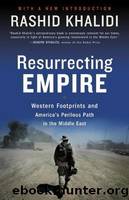Resurrecting Empire: Western Footprints and America's Perilous Path in the Middle East by Khalidi Rashid

Author:Khalidi, Rashid [Khalidi, Rashid]
Language: eng
Format: epub
Tags: History, Politics
ISBN: 9780807003145
Goodreads: 16030336
Publisher: Beacon Press
Published: 2004-01-01T08:00:00+00:00
CHAPTER FOUR
THE UNITED STATES AND PALESTINE
Zionism, be it right or wrong, good or bad, is rooted in age-long traditions, in present needs, in future hopes, of far greater import than the desires and prejudices of the 700,000 Arabs who now inhabit that ancient land.
âARTHUR JAMES BALFOUR, AUGUST 11, 1919
The Palestinians must be made to understand in the deepest recesses of their consciousness that they are a defeated people.
âMOSHE YAALON, ISRAELI ARMY CHIEF OF STAFF, AUGUST 30, 2002
As with many other unresolved issues in the modern Middle East, it was Great Britain rather than the United States that initially created the problem of Palestine. But in Palestine, as elsewhere, it has been the lot of America, Britainâs successor as the Western power with undisputed hegemony over the Middle East, to contend with this problem and its seemingly unending sequels. The outlines of the problem can be simply stated: with the Balfour Declaration of November 2, 1917,1 Britain threw the weight of the greatest power of the age, one that was at that moment in the process of conquering Palestine, behind the creation of a Jewish state in what was then an overwhelmingly Arab country.2 Everything that has followed in that conflict-riven land has flowed inevitably from this decision.
As previously discussed, the United States was not, in 1917 and for several decades thereafter, a power with significant interests in the Middle East, beyond relatively modest cultural, educational, and missionary concerns. Nevertheless, some of the same religious and romantic factors that led many European Protestants to extend their fervent support to Zionism affected American Protestants, with the same potent political results. Beyond what they knew from tales from the Bible, Americans in the early twentieth century knew very little about Palestine, and this biblical knowledge generally served to obscure almost completely the realities of the contemporary Middle East. Americans knew considerably less about the region than did Europeans, who had long been engaged in trading with, invading, and visiting it. Moreover, in consequence of these lengthy contacts, several European countries, notably Britain, France, Germany, Russia, the Netherlands, Italy, and Spain, had developed a high degree of scholarly expertise about aspects of Islam and Middle Eastern languages, history, and culture, with knowledge following power and thereafter serving as its handmaiden, as so often it does.3 There was little such expert academic knowledge about the Middle East in the United States, which did not even have a permanent foreign intelligence service until after World War II.4
There were other reasons beyond the potent influence of the Bible for Americans to be attracted by the lure of Zionism. Because of their own pioneer heritage, Americans were even more apt than Europeans to identify with lurid images of brave, outnumbered settlers of European stock taming an arid land in the face of opposition from ignorant, fanatical nomadsâwildly distorted and unrealistic (albeit lasting) though these images were.5 For these and other reasons, soon after the beginning of the modern political Zionist enterprise around the turn of the twentieth century, many American politicians declared themselves strongly supportive of it.
Download
This site does not store any files on its server. We only index and link to content provided by other sites. Please contact the content providers to delete copyright contents if any and email us, we'll remove relevant links or contents immediately.
| Bahrain | Egypt |
| Iran | Iraq |
| Israel & Palestine | Jordan |
| Kuwait | Lebanon |
| Oman | Qatar |
| Saudi Arabia | Syria |
| Turkey | United Arab Emirates |
| Yemen |
Empire of the Sikhs by Patwant Singh(23069)
The Wind in My Hair by Masih Alinejad(5085)
Rise and Kill First by Ronen Bergman(4775)
The Templars by Dan Jones(4681)
The Rape of Nanking by Iris Chang(4199)
12 Strong by Doug Stanton(3541)
Blood and Sand by Alex Von Tunzelmann(3191)
Babylon's Ark by Lawrence Anthony(2670)
The History of Jihad: From Muhammad to ISIS by Spencer Robert(2618)
No Room for Small Dreams by Shimon Peres(2360)
The Turkish Psychedelic Explosion by Daniel Spicer(2352)
Inside the Middle East by Avi Melamed(2348)
Gideon's Spies: The Secret History of the Mossad by Gordon Thomas(2335)
Arabs by Eugene Rogan(2292)
The First Muslim The Story of Muhammad by Lesley Hazleton(2261)
Come, Tell Me How You Live by Mallowan Agatha Christie(2246)
Bus on Jaffa Road by Mike Kelly(2150)
1453 by Roger Crowley(2018)
Kabul 1841-42: Battle Story by Edmund Yorke(2014)
